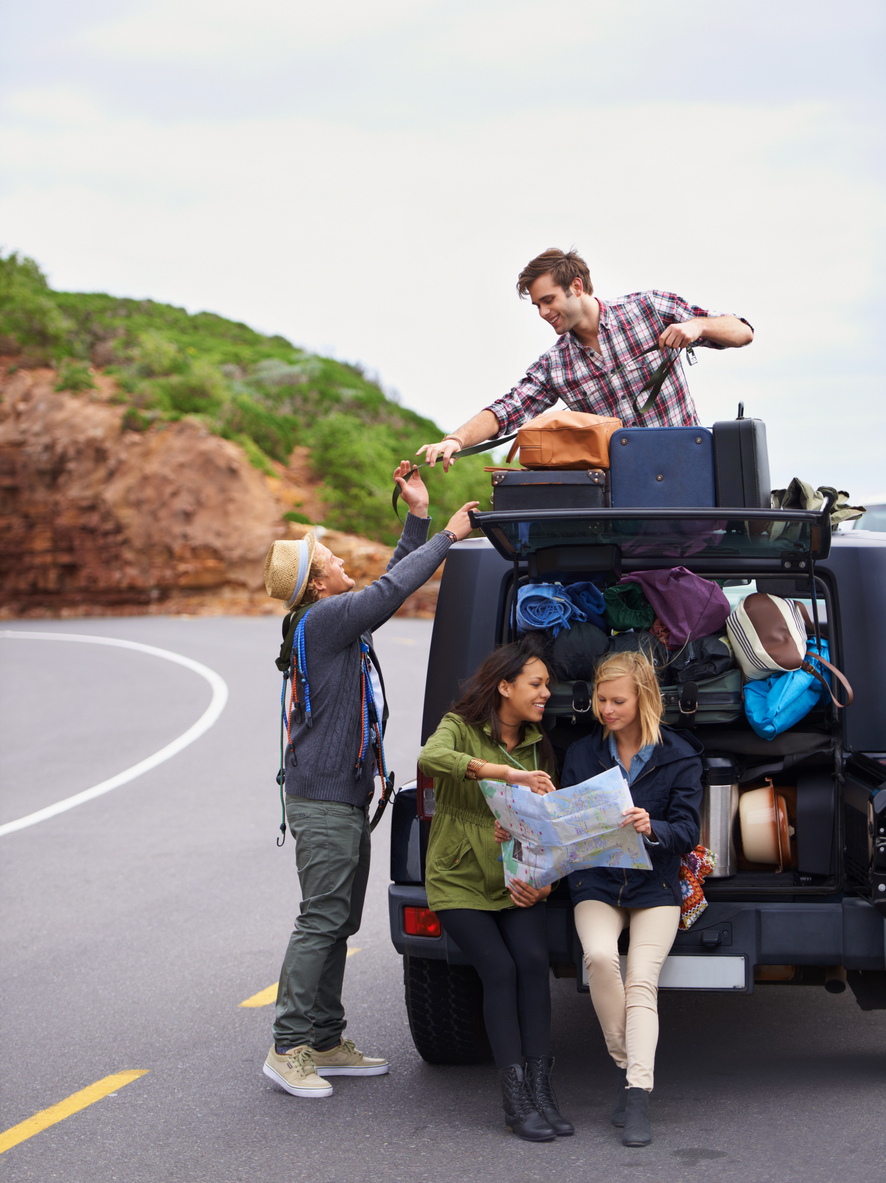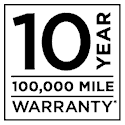

The start of summer is just days away, and we’re getting ready for all of the adventures and excitement! Join us in learning how to best prepare your car for the ultimate road trip getaway, so you can be safe, on the ball, and ready for whatever the road throws your way. From service pointers to must-have organizers to safety gear, we’ve got you covered.
Must Check Automotive Service Points Before Your Next Road Trip
Check your battery.
Dead batteries are the worst! There is no worse feeling than being halfway to your destination at a rest stop with a car that just won’t start. Get your battery checked out by your local service center, and ensure that it is properly conditioned, especially if it’s older than 2 years. Additionally, you’ll want to make sure the connectors are showing no signs of corrosion and the connection is tight. Your trusted service technician can also help you clean the corrosion if you notice any.
Have your brakes inspected.
Have your service technician give the brakes system a good once-over. If you’ve noticed any squealing or squeaking or whistling sounds coming from your vehicle’s brakes, it may be a sign that parts are wearing down and in need of replacement soon. Make sure that any odd noises are examined by your mechanic, and serviced prior to embarking on your journey. If your brake pedal feels spongy or soft when depressed, it may indicate low brake fluid. If you’re noticing longer stopping times, you may need new brake pads.
Check the fluid levels.
Be sure to check all of the vital fluids in your vehicle including the engine oil, transmission fluid, power steering fluid, engine coolant, and wiper fluids. If you’re just about due for an oil change, go ahead and get that scheduled a little earlier prior to your trip. It’s better to be safe than sorry!
Clean and change your filters.
If you’re getting an oil change that filter will be swapped out at the same time. You’ll also want to check the engine filter and air filter while you’re there.
Test all lights and signals and change bulbs as needed.
With all the driving you’re about to do, especially if part of your journey will be at night or during inclement weather, it’s vital to make sure they’re fully functioning for visibility and safety. Plus, you don’t want to receive any unnecessary traffic tickets for dysfunctional turn signals or brake lights. Check the interior lights as well and replace those bulbs as needed.
Change your wiper blades.
On average you should be replacing your wipers every 6 months, but it would at least be a good idea to replace them before your trip if you haven’t done so in a while. Select wipers that have an aid of hydrophobic coating to aid even clearer visibility during rain and misty weather.
Check your insurance, license, and registration.
Don’t get caught without proper paperwork on hand! Ensure that you’ve renewed your license, printed or received your newest up to date insurance cards, and have renewed your vehicle registration and all paperwork is stowed safely in your glovebox or center console. We also recommend checking if your insurance provider has a phone or tablet app available as those can come in handy in a pinch!
Be Prepared for roadside emergencies.
Stock your emergency roadside kit.
We’ve already covered car emergency kits and roadside assistance in previous blogs, but here’s a short refresher of our recommended necessities. At bare minimum, you should always have the following in your car when traveling long distances: a solar or hand-cranked flashlight; jumper cables; portable battery packs; hand sanitizer and flushable wipes; a tire patch kit and portable air compressor; paper copies of maps for each of your destination regions; flares or LED warning lights; bottled water and shelf stable snacks (protein bars and granola bars are a great option);emergency contact numbers written on a piece of paper in your glovebox or wallet or stowed in your emergency kit; a basic first aid kit.
Travel with charging options.
Grabbing a few extra USB cables or wireless chargers is a great idea. Make sure you have portable batteries and their recharging cables as well. Additional wall connector bricks are another key option. Keep one in your glovebox with a charge cable, and one in your backpack or purse or other luggage. We also recommend a portable smartphone mount for hands-free navigation and emergency use.
Take advantage of fueling stations along your route whenever possible.
There’s nothing more nerve wracking than being caught in stop-and-go traffic and having the fuel light tick on, especially if you’re not sure when the next rest stop is or nearest fueling station! Ensuring that you’re traveling with no less than ½ a tank of gas at all times can give you a very good buffer for emergencies and unexpected delays. When traveling on highways and byways and especially in unfamiliar areas, it’s always best to top off your tank when you have the opportunity. You never know when you may hit a snarl of traffic, unexpected detour, or may even miss a GPS direction and take a wrong turn.
Remember to pack your medications and OTC pain relief and emergency medications.
When traveling, remember to keep your vital medications and inhalers on your person. Make sure your travel companions know where to find them and how to access an emergency list of medications if needed. If you use an Epi Pen, bring that with you and ensure everyone knows how to use it in case. Additionally, Benadryl is a great medication to travel with in case of surprise allergic reactions.
Travel with all the necessities and creature comforts.
You’ll never go wrong with packing a few extra rolls of toilet paper along with wet wipes. Heaven forbid the bathroom is understocked, or you have to make an emergency roadside pit stop. A portable toothbrush and toothpaste and some anti-nausea medication can relieve motion sickness. Reusable camping utensils and portable plates/cups are always a help! Along with a cooler filled with fresh fruit, premade lunch items, and other fresh snacks to save you time and money from making pit stops. A small travel pillow and blanket will come in handy if you need to take a catnap or swap off with another driver for some rest. If you’re traveling with pets, we recommend quick-dry towels, a spare leash and collar, portable collapsible pet bowls, a portable litter box (if applicable) and some spare snacks.
What do you like to bring as a road trip essential? What are your go-to emergency kit items in your experience? Let us know in the comments on our social media!


![[Facebook]](https://www.classickiaonline.com/blogs/294/wp-content/plugins/bookmarkify/facebook.png)
![[LinkedIn]](https://www.classickiaonline.com/blogs/294/wp-content/plugins/bookmarkify/linkedin.png)
![[Twitter]](https://www.classickiaonline.com/blogs/294/wp-content/plugins/bookmarkify/twitter.png)
![[Yahoo!]](https://www.classickiaonline.com/blogs/294/wp-content/plugins/bookmarkify/yahoo.png)
![[Email]](https://www.classickiaonline.com/blogs/294/wp-content/plugins/bookmarkify/email.png)



 Warranties include 10-year/100,000-mile powertrain and 5-year/60,000-mile basic. All warranties and roadside assistance are limited. See retailer for warranty details.
Warranties include 10-year/100,000-mile powertrain and 5-year/60,000-mile basic. All warranties and roadside assistance are limited. See retailer for warranty details.